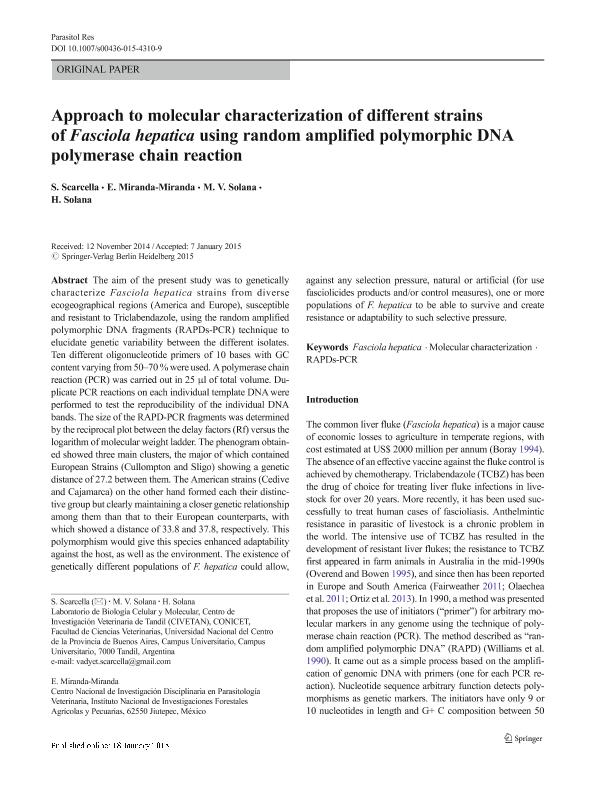Mostrar el registro sencillo del ítem
dc.contributor.author
Scarcella, Silvana Andrea

dc.contributor.author
Miranda Miranda, E.
dc.contributor.author
Solana, María Victoria

dc.contributor.author
Solana, Hugo Daniel

dc.date.available
2018-02-28T18:41:39Z
dc.date.issued
2015-03
dc.identifier.citation
Scarcella, Silvana Andrea; Miranda Miranda, E.; Solana, María Victoria; Solana, Hugo Daniel; Approach to molecular characterization of different strains of Fasciola hepatica using random amplified polymorphic DNA polymerase chain reaction; Springer; Parasitology Research; 114; 4; 3-2015; 1341-1345
dc.identifier.issn
0932-0113
dc.identifier.uri
http://hdl.handle.net/11336/37422
dc.description.abstract
The aim of the present study was to genetically characterize Fasciola hepatica strains from diverse ecogeographical regions (America and Europe), susceptible and resistant to Triclabendazole, using the random amplified polymorphic DNA fragments (RAPDs-PCR) technique to elucidate genetic variability between the different isolates. Ten different oligonucleotide primers of 10 bases with GC content varying from 50–70 % were used. A polymerase chain reaction (PCR) was carried out in 25 μl of total volume. Duplicate PCR reactions on each individual template DNA were performed to test the reproducibility of the individual DNA bands. The size of the RAPD-PCR fragments was determined by the reciprocal plot between the delay factors (Rf) versus the logarithm of molecular weight ladder. The phenogram obtained showed three main clusters, the major of which contained European Strains (Cullompton and Sligo) showing a genetic distance of 27.2 between them. The American strains (Cedive and Cajamarca) on the other hand formed each their distinctive group but clearly maintaining a closer genetic relationship among them than that to their European counterparts, with which showed a distance of 33.8 and 37.8, respectively. This polymorphism would give this species enhanced adaptability against the host, as well as the environment. The existence of genetically different populations of F. hepatica could allow, against any selection pressure, natural or artificial (for use fasciolicides products and/or control measures), one or more populations of F. hepatica to be able to survive and create resistance or adaptability to such selective pressure.
dc.format
application/pdf
dc.language.iso
eng
dc.publisher
Springer

dc.rights
info:eu-repo/semantics/openAccess
dc.rights.uri
https://creativecommons.org/licenses/by-nc-sa/2.5/ar/
dc.subject
Fasciola Hepatica
dc.subject
Molecular Characterization
dc.subject
Rapds-Pcr
dc.subject.classification
Ciencias Veterinarias

dc.subject.classification
Ciencias Veterinarias

dc.subject.classification
CIENCIAS AGRÍCOLAS

dc.title
Approach to molecular characterization of different strains of Fasciola hepatica using random amplified polymorphic DNA polymerase chain reaction
dc.type
info:eu-repo/semantics/article
dc.type
info:ar-repo/semantics/artículo
dc.type
info:eu-repo/semantics/publishedVersion
dc.date.updated
2018-02-28T14:12:42Z
dc.journal.volume
114
dc.journal.number
4
dc.journal.pagination
1341-1345
dc.journal.pais
Alemania

dc.journal.ciudad
Berlin
dc.description.fil
Fil: Scarcella, Silvana Andrea. Consejo Nacional de Investigaciones Científicas y Técnicas. Centro Científico Tecnológico Conicet - Tandil. Centro de Investigación Veterinaria de Tandil. Universidad Nacional del Centro de la Provincia de Buenos Aires. Centro de Investigación Veterinaria de Tandil. Provincia de Buenos Aires. Gobernación. Comision de Investigaciones Científicas. Centro de Investigación Veterinaria de Tandil; Argentina
dc.description.fil
Fil: Miranda Miranda, E.. Instituto Nacional de Investigaciones Forestales Agrícolas y Pecuarias; México
dc.description.fil
Fil: Solana, María Victoria. Consejo Nacional de Investigaciones Científicas y Técnicas. Centro Científico Tecnológico Conicet - Tandil. Centro de Investigación Veterinaria de Tandil. Universidad Nacional del Centro de la Provincia de Buenos Aires. Centro de Investigación Veterinaria de Tandil. Provincia de Buenos Aires. Gobernación. Comision de Investigaciones Científicas. Centro de Investigación Veterinaria de Tandil; Argentina
dc.description.fil
Fil: Solana, Hugo Daniel. Consejo Nacional de Investigaciones Científicas y Técnicas. Centro Científico Tecnológico Conicet - Tandil. Centro de Investigación Veterinaria de Tandil. Universidad Nacional del Centro de la Provincia de Buenos Aires. Centro de Investigación Veterinaria de Tandil. Provincia de Buenos Aires. Gobernación. Comision de Investigaciones Científicas. Centro de Investigación Veterinaria de Tandil; Argentina
dc.journal.title
Parasitology Research

dc.relation.alternativeid
info:eu-repo/semantics/altIdentifier/doi/http://dx.doi.org/10.1007/s00436-015-4310-9
dc.relation.alternativeid
info:eu-repo/semantics/altIdentifier/url/https://link.springer.com/article/10.1007%2Fs00436-015-4310-9
Archivos asociados
